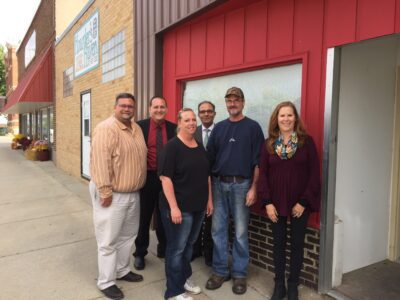 ADRIAN, Minn.— Egan’s Market will remain on Adrian’s Main Street for years to come thanks to a partnership financing improvements to the meat locker. Owned by Bruce Vortherms and Michele Bulau, the small-town business has been in Vortherms’ family, on his mother’s side, for 70 years. It was established as a butcher shop in the early 1900s, even before his grandpa bought it and named it Egan’s Market.
ADRIAN, Minn.— Egan’s Market will remain on Adrian’s Main Street for years to come thanks to a partnership financing improvements to the meat locker. Owned by Bruce Vortherms and Michele Bulau, the small-town business has been in Vortherms’ family, on his mother’s side, for 70 years. It was established as a butcher shop in the early 1900s, even before his grandpa bought it and named it Egan’s Market.
After 18 years of owning the business, Vortherms and Bulau needed to invest in new equipment, or close up shop. Southwest Initiative Foundation (SWIF), First State Bank Southwest in Worthington, Worthington Regional Economic Development Corporation and the Adrian Housing and Redevelopment Authority came together to provide capital for installation of a new walk-in freezer and monorail scale as well as minor building repairs.
“The freezer will be a good asset because it will make the front end brighter, and it will make our retail more appealing,” said Bulau, who manages much of the retail sales. “And it will be more convenient for customers to come and pick up their meat because it will be in the front instead of the back.”
Egan’s Market processes beef, hogs and deer as well as buffalo, goats and sheep. It attracts a wide variety of clientele locally as well as from the Twin Cities, Iowa and South Dakota. Customer favorites include the blueberry maple patties, hamburger and sausage patties.
Bulau went to school for hospitality management and has experience in retail and food service. Vortherms worked at different meat packing facilities, specializing in hogs. When they bought the business from Bob and Sue Egan, the former owners gave them an education in processing different carcasses, running all the equipment and deboning. Bob Egan is Vortherms’ cousin, and they are the third generation of the same family running the butcher shop.
Purchasing the market originally was challenging for Bulau. First State Bank Southwest in Worthington helped the couple with the initial loan to buy the business. And Mark Vis, Vice President and Commercial Loan Officer at the bank, was a critical resource for finding a way to improve the business and keep it going, Bulau added.
“When you start out you really don’t have anything, so they gave us a chance,” Bulau said. “If you have the determination and the will to make things work, I really believe they’ll work. If you work hard at it, I think that comes across to your customers.”
SWIF was also part of the unique funding partnership among local government, banking and nonprofit organizations.
“This is a good story of four lenders coming together to help keep a long-standing business in the community,” said SWIF Program Officer Jackie Turner. “We’re happy to see Bruce and Michele build on their past success, and to be part of their future success.”
Loan programs have been a key function of SWIF since its inception to support communities and businesses throughout southwest Minnesota. In 2001, microlending was added to existing programs as a tool to support small businesses and people looking for self-employment opportunities by providing market-rate loans.
Microloan clients receive free technical assistance from SWIF staff — who all have personal business experience — to improve their business management skills. Areas of support include business planning and reading financials, QuickBooks training, marketing assistance and other training opportunities for the life of the loan.
This microloan program receives funding assistance from the U.S. Small Business Administration and U.S. Department of Agriculture. For more information, contact SWIF at 800-594-9480, 320-587-4848 or [email protected].
The Southwest Initiative Foundation is a single connection offering unlimited possibilities to grow and promote kids, families, businesses, entrepreneurs and communities in rural southwest Minnesota. As a regional community foundation, SWIF has contributed more than $75 million through its grant and loan programs. Through its business finance programs, SWIF has helped start or expand more than 700 businesses, which have created or retained more than 8,600 jobs. SWIF also established 26 community affiliates and more than 100 school, donor-advised and other funds, as well as 16 Early Childhood Initiative coalitions to support young children. SWIF has received 1,650 acres of farmland through our Keep It Growing℠ farmland giving program. The Southwest Initiative Foundation is an equal opportunity provider and employer. To learn more, visit www.swifoundation.org.
# # #




